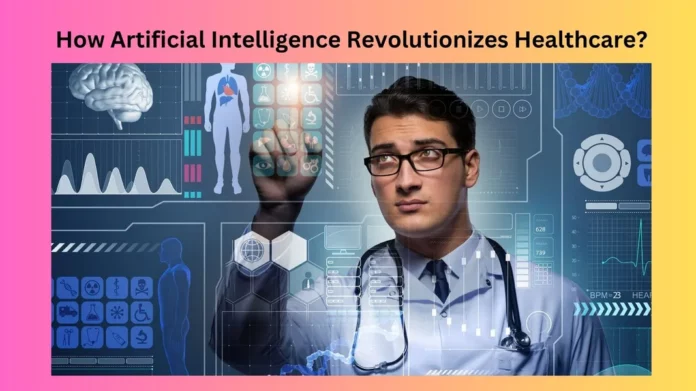In recent years, the marriage of artificial intelligence (AI) and healthcare has given birth to groundbreaking advancements. From diagnosing diseases to personalized treatment plans, AI is reshaping the landscape of healthcare. This article aims to unravel the complexities behind how artificial intelligence works in healthcare, exploring its applications, benefits, and potential future impact.
Understanding the Basics:
1: The Foundation of Artificial Intelligence in Healthcare
Artificial intelligence, in essence, involves machines simulating human intelligence. In healthcare, this translates into machines mimicking human cognitive functions like learning, problem-solving, and decision-making.
2: Machine Learning: The Powerhouse Behind AI in Healthcare
At the core of AI’s success in healthcare lies machine learning (ML), a subset of AI. ML enables machines to learn from data, identify patterns, and make predictions or decisions without explicit programming.
Applications of AI in Healthcare:
1: Diagnostics and Imaging Advancements
One of AI’s transformative impacts is in medical diagnostics. AI-powered imaging systems can detect subtle abnormalities in scans, aiding in early and accurate diagnosis of diseases.
2: Personalized Medicine: Tailoring Treatments to Individuals
AI analyzes vast datasets, including genetic information, to create personalized treatment plans. This shift from a one-size-fits-all approach to targeted treatments enhances efficacy and reduces side effects.
3: Drug Discovery Acceleration
Traditional drug discovery is a lengthy process, but AI expedites it by predicting potential drug candidates and their effects. This not only saves time but also opens new avenues for innovation.
4: Virtual Health Assistants: Enhancing Patient Care
AI-driven virtual assistants provide personalized health information, medication reminders, and even emotional support. These virtual companions are transforming patient engagement and adherence to treatment plans.
The Mechanics Behind AI’s Decision-Making:
1: Neural Networks: Mimicking the Human Brain
In healthcare, AI often employs neural networks, which are designed to imitate the human brain’s structure. These networks process information and make decisions based on patterns, just like the human mind.
2: Natural Language Processing: Understanding Human Communication
AI systems utilize natural language processing to understand and respond to human language. This capability is harnessed in medical records analysis, enabling more efficient data extraction.
Addressing Concerns:
1: Ethical Considerations in AI Healthcare
As AI gains prominence in healthcare, ethical concerns emerge. Issues such as data privacy, bias in algorithms, and the potential for job displacement require careful consideration and regulation.
2: The Human Touch: Balancing AI and Human Interaction
While AI brings efficiency and accuracy, maintaining a balance with human involvement is crucial. The ideal healthcare scenario combines the strengths of AI with the empathetic touch of human caregivers.
Future Prospects:
1: Advancements on the Horizon
The future of AI in healthcare holds promise for even more sophisticated applications. From predictive analytics to robotic surgeries, ongoing research and development are pushing the boundaries of what is possible.
2: AI and Global Healthcare Accessibility
AI has the potential to bridge healthcare gaps globally by providing access to expert diagnostics and treatments in underserved regions. This democratization of healthcare services could revolutionize the industry.
Conclusion:
In conclusion, the integration of artificial intelligence into healthcare represents a paradigm shift. From improving diagnostics to personalizing treatments, AI is reshaping the way we approach healthcare. However, it’s essential to tread carefully, addressing ethical concerns and ensuring a harmonious balance between AI and human care.
FAQs:
Q1: Can AI completely replace human healthcare professionals?
A1: No, AI is designed to complement human skills, not replace them. It enhances efficiency and accuracy but cannot replicate the emotional intelligence and empathy that human caregivers provide.
Q2: How secure is patient data in AI-driven healthcare systems?
A2: Ensuring the security and privacy of patient data is a top priority in AI healthcare. Stringent measures and encryption techniques are implemented to safeguard sensitive information.
Q3: Are there risks of bias in AI algorithms affecting medical decisions?
A3: Yes, bias in AI algorithms is a concern. Continuous monitoring, transparency in algorithms, and diverse data inputs are essential in mitigating bias risks.
Q4: Can AI be affordable and accessible to healthcare facilities in developing countries?
A4: Efforts are underway to make AI technologies more accessible globally. Initiatives aim to develop cost-effective solutions and provide training to healthcare professionals in resource-limited settings.
Q5: How can patients ensure the ethical use of AI in their healthcare?
A5: Patients should stay informed about the AI systems used in their care, inquire about data privacy policies, and advocate for transparent and ethical practices in healthcare AI implementations.















